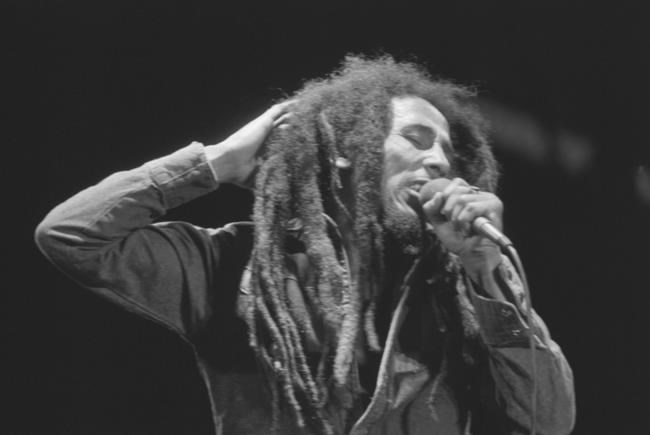
FILE - Jamaican Reggae singer Bob Marley performs in front of an audience of 40,000 during a festival concert of Reggae in Paris, France, July 4, 1980. The biopic “Bob Marley: One Love” has been a box office hit in the United States and several other countries. The film, starring Kingsley Ben-Adir, is focused on the Rastafari legend’s story during the making of his 1977 album “Exodus” while leading up to his impactful concert in his native Jamaica. (AP Photo/Jacques Langevin, File)
Republished March 13, 2024 - 10:28 AM
Original Publication Date March 13, 2024 - 8:31 AM
NEW YORK (AP) — The biopic “Bob Marley: One Love” has been a box-office hit in the United States and several other countries. The film, starring Kingsley Ben-Adir, is focused on the Rastafari legend’s story during the making of his 1977 album “Exodus” while leading up to a momentous concert in his native Jamaica.
The Rastafari faith is rooted in the Caribbean island in the 1930s. Its message was spread across the world in the 1970s by Marley — the faith’s most famous exponent. For decades, Rastafari have been prosecuted for their ritualistic use of marijuana. Some of those laws have eased, granting Rastafari sacramental authorization to grow the marijuana they deem sacred.
Here is a quick look at the faith's beliefs and history:
WHAT DO RASTAFARI BELIEVE?
The Rastafari faith is rooted in 1930s Jamaica, growing as a response by Black people to white colonial oppression. The beliefs are a melding of Old Testament teachings and a desire to return to Africa.
Both are crucial to Marley's lyrics and worldview. In “ The Bible and Bob Marley: Half the Story Has Never Been Told,” author Dean A. MacNeil writes that Marley's personal Bible was a King James version. It included on its cover a photocopied image of the late Ethiopian Emperor Haile Selassie, who is worshipped by most Rastafari.
The Rastafari message was spread across the world in the 1970s by Marley and Peter Tosh, another Jamaican reggae legend and globally known Rastafari.
In the film “One Love,” the actor who plays Marley mentions “Jah” several times.
That's because Rastafari’s personal relationship with “Jah,” or God, is considered central to the faith.
Rastafari reject materialist values and often practice a strict oneness with nature. They also let their hair grow, uncombed, into dreadlocks.
In several scenes in the film — produced with the involvement of the Marley estate — Marley sings to large crowds of people who wave Rastafari flags in the green, gold and red colors of the faith.
WHY DO RASTAFARI USE SACRAMENTAL MARIJUANA?
Rastafari followers believe the use of marijuana is directed in biblical passages and that the “holy herb” induces a meditative state and brings them closer to the divine. The faithful smoke it as a sacrament in chalice pipes or cigarettes called “spliffs,” add it to plant-based organic stews and place it in fires as a burnt offering.
For decades, many have been jailed and endured racial and religious profiling by law enforcement because of their marijuana use. Many also were treated as second-class citizens across the Caribbean islands, looked down on for their dreadlocks and use of marijuana.
WHO BROUGHT MARIJUANA TO THE CARIBBEAN?
“Ganja,” as marijuana is known in the Caribbean, has a long history in Jamaica, and its arrival predates the Rastafari faith. Indentured servants from India brought the cannabis plant to the island in the 19th century, and it gained popularity as a medicinal herb.
As public opinion and policy continues to shift across the world toward the legalization of marijuana for both medical and recreational purposes, Rastafari are demanding for broader relaxation to curb persecution and ensure freedom of worship.
Some nations, including the Caribbean nation of Antigua & Barbuda, have granted the Rastafari authorization to grow and smoke the herb that they deem holy.
WHO IS HAILE SELASSIE?
In one of the first scenes of the film, Marley mentions this name. That's because most of the many Rastafari sects worship Selassie. This is rooted in Jamaican Black nationalist leader Marcus Garvey’s 1920s prediction that a “Black king shall be crowned” in Africa, ushering in a “day of deliverance.”
When an Ethiopian prince named Ras Tafari, who took the name Haile Selassie I, became emperor in 1930, the descendants of the enslaved in Jamaica took it as proof that Garvey’s prophecy was being fulfilled. When Selassie visited Jamaica in 1966, he was greeted by adoring crowds, and some Rastafari insisted miracles and other mystical occurrences took place during his visit to the island.
___
Associated Press religion coverage receives support through the AP’s collaboration with The Conversation US, with funding from Lilly Endowment Inc. The AP is solely responsible for this content.
News from © The Associated Press, 2024